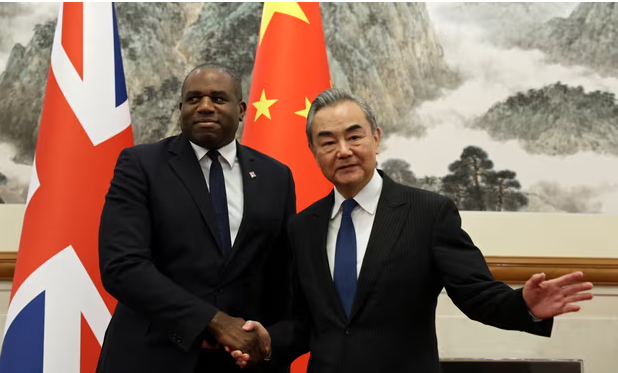David Lammy brings up Ukraine and human rights during discussions in Beijing.
David Lammy pressed his Chinese counterpart on human rights concerns and China’s support for Russia’s invasion of Ukraine during talks in Beijing, the Foreign Office has said.
The foreign secretary had been under pressure to take a tough line on a range of human rights issues with the Chinese foreign minister, Wang Yi, when the pair met on Friday during Lammy’s first visit to China since taking office.
In a statement issued after the meeting, the Foreign Office described the encounter as “constructive”, noting Lammy raised “a number of foreign policy and security matters”, including Chinese companies supplying equipment to the Russian military and the conflict in the Middle East.
It added that human rights were discussed, including in relation to the mistreatment of Uyghurs in Xinjiang, in China’s far west, and the detention of British national Jimmy Lai in Hong Kong.
But the statement made no direct reference to Taiwan. Earlier in the week, China held large-scale military exercises around the island, which Keir Starmer described as “not conducive to peace and stability”.
During his visit to Beijing, Lammy also met Ding Xuexiang, the most senior of China’s vice-premiers and a close associate of the president, Xi Jinping.
Lammy said the UK government would bring “consistency” to relations with China, adding there had not been “sufficient contact” between London and Beijing under his predecessors, particularly on human rights issues.
Speaking to reporters in Shanghai on Saturday, he said the meetings were “the beginning of a process”, adding it had been important to “restart dialogue”.
He said: “It’s only in dialogue that we can bring about better understanding and change. I believe what you need is more diplomacy, not less. That’s why it’s so important to be here as a UK foreign secretary and to keep coming back.
“And, of course, I was able to have dialogue with the Chinese on areas where we disagree, areas like Hong Kong, areas like Taiwan, areas like human rights in Xinjiang, we were able to have those conversations and raise difficult, challenging issues.”
Before travelling to China, Lammy had said it was important to speak “candidly” about “both areas of contention as well as areas for cooperation in the UK’s national interest”.
But the government has distanced itself from comments Lammy made while in opposition in which he suggested actions against the mainly Muslim Uyghurs should be declared a genocide.
A Downing Street spokesperson said on Thursday that such decisions were for “competent courts”, adding: “We stand firm on human rights and we’ve been very clear that China continues to persecute and arbitrarily detain the Uyghurs and other predominantly Muslim minorities.”
Along with human rights and security concerns, the statement said Lammy raised a number of areas for “pragmatic, mutually beneficial cooperation” with Beijing.
These included the transition to green energy, international development, global health, the safe use of AI and promoting “secure and resilient growth” through trade and investment.
According to a statement by the Chinese government, Ding said China was “ready to work with the UK” to create “a more stable and mutually beneficial” relationship, and also stressed the need for “pragmatic cooperation”.
Lammy’s visit is the second by a British foreign secretary in two years, after a trip by James Cleverly in August 2023. That visit marked a slight thaw in UK-Chinese relations, with Cleverly becoming the first foreign secretary to visit the country since 2018.
He too had stressed the need for a “pragmatic” relationship with Beijing, but also raised concerns about human rights in Hong Kong and Xinjiang.













